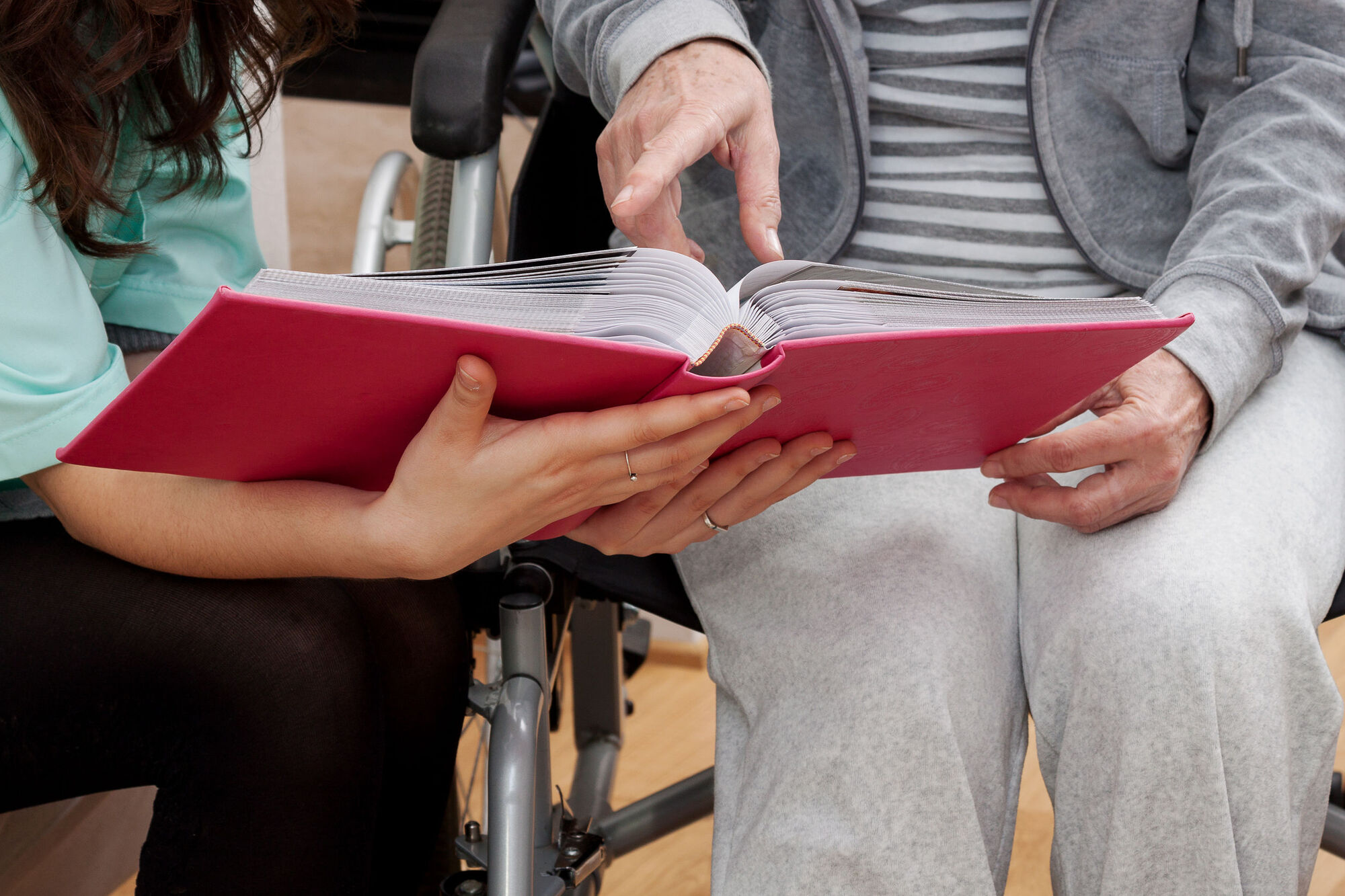In this article
Volunteering in a care home can be an incredibly rewarding thing to do and the relationship between residents and volunteers is not just one-sided. Volunteering opportunities can prove transformational, promoting inter-generational and cultural understanding and respect.
It helps residents to keep in touch with the outside world, gives them an opportunity to remember the good times and improves their wellbeing and quality of life. For the volunteers, volunteering could be the perfect way to find out if you are suited to these types of roles, and this could become a new career path.
One of the great things about working with older people is that you can learn a lot from them, hearing their stories and learning about the history they have lived through.
Volunteering also helps you to develop skills such as:
- Communication.
- Empathy.
- People skills.
- Confidence.
- Teamwork.
- Listening.
- Time management.
- Work experience.
As well as the sense of satisfaction to be gained from helping others, it looks great on your CV.
For care home staff, having the support of volunteers in their homes is welcomed for the benefits it gives to residents and relatives bringing the community into the care home.
Some statistics
The Royal Voluntary Service found that 46% of people aged 55–74 were volunteers, which is a total of around 6.2 million people. Government figures show that 23% of people aged 16 and over in England took part in formal volunteering at least once a month in the year ending March 2020, however, their data does not include informal volunteering, for example doing unpaid work for friends or family.
Women were found to be more likely to have taken part in regular volunteering than men, with 41% having volunteered monthly at some stage, compared to 36% of men.
Volunteers’ Week’s research shows that in 2018/19, 19.4 million (36%) people volunteered through a group at least once a year and over 11.9 million (22%) of people did so at least once a month. The most common reason overall for volunteering is wanting to improve things or help people (42%). 67% of volunteers give their time to charities and community groups including care homes.

What is volunteering in care homes?
Volunteering is when someone spends unpaid time doing something to benefit others. Volunteering is well established in the UK and most care organisations involve volunteers in some way.
Volunteers can be any age but are usually over 16 years and from any background. They can be studying, looking for work, working, not working or retired, and some companies will even give time off to their employees to volunteer.
The main requirements you will need are:
- Time to give – Even an hour a week can make all the difference.
- Enthusiasm – This makes a huge impact to residents’ wellbeing.
- Reliability – Spending a little, regular time getting to know residents.
- A friendly and approachable nature – Helps residents to keep in touch with the outside world.
- You enjoy interacting with people – Providing companionship to people living in care homes, especially those who don’t have visits from friends or family.
Whatever your background, interests and experience, a care home will find the right opening for you.
Care homes usually have a wide range of opportunities to suit volunteers’ availability, skills and interests and these include but are not limited to:
- Befriending – Just spending a little time talking with residents.
- Helping with leisure and social activities and events – Anything from calling bingo numbers, giving interesting talks, reading to residents, accompanying residents on outings etc.
- Hairdressing – Skilled hairdressers are often sought.
- Gardening – Helping residents maintain their garden plot if they have one or helping out in the home’s grounds.
- Driving – Ferrying residents to appointments, collecting prescriptions, shopping, running errands.
- Clerical and administration – Helping residents with correspondence, form filling etc.
- Kitchen/catering – Helping with mealtimes, serving refreshments.
- Housekeeping – Bedmaking, room tidying.
- Helping with languages – Helping residents for whom English is not their first language.
Every volunteering opportunity is different, but in essence each is about making friends, sharing hobbies/interests, and creating new experiences.
Volunteers don’t require any specialist qualifications or prior experience; they are usually supported with a training programme and regular support and contact with the home’s volunteer coordinator. There are often opportunities to get together with other care home volunteers and to make new friends.
How to volunteer
Most care providers offer volunteering opportunities and work experience placements at their care homes and these are often advertised on their websites, or you can apply through one of the voluntary service providers such as:
Once you apply, if the care home has openings for volunteers, they will invite you for an interview.
This is normally informal and they will want to talk to you about:
- The role and how your skills and experience would fit it.
- Why you want to volunteer and what motivates you.
- What time you have available to commit to volunteering.
- Any requirements you will need to meet before appointment as a volunteer, for example satisfactory references, health check if the role involves physical activity, DBS checks – these are an important part of safeguarding and working with vulnerable people.
- What support and training you will get in the role.
Volunteers are not employees and are not covered by employment law, however, they are required to comply with the organisation’s regulations, policies and procedures whilst on volunteer duty. Here is an overview of one of the most important policies and regulations you will need to comply with when volunteering in a care home.

Respecting dignity and privacy
Dignity in care work and volunteering focuses on the value of every person as an individual. It means respecting others’ views, choices and decisions, not making assumptions about how people want to be treated and working with care and compassion. As far as possible, you should get to know each individual; their background and ideas, wishes, likes and dislikes.
You should always provide personalised care and support that puts an individual at the centre of their care. You should enable them to be as independent as possible and respect their privacy and dignity. Working in this way reduces the risk of an individual being treated in a way that is degrading or harmful.
There are many ways that an individual’s privacy or dignity could be compromised; here are some examples of those situations:
- When entering the room an individual is in while they are unaware of your presence, always knock and wait to be invited to enter.
- When you are arranging an individual’s clothing, be conscious of the person’s modesty.
- When speaking about personal information in a public place where there are unauthorised people who could overhear, always be mindful of people’s right to privacy and only discuss confidential or personal information in private with authorised people.
- When you need to touch an individual to help them wash or something similar, always get their permission first and explain what you will be doing beforehand.
Person-centred care is based on principles of dignity and respect and there are seven core principles:
Value the uniqueness of every individual
This means that when you are offering care and support, see more than just an individual’s care and support needs, see the uniqueness of the person.
Value and respect the individual as a unique person who has the right to choose and have control over how their needs, wishes and preferences are met. An example of this principle in practice might be:
- Tea is served at 4pm for residents, but Harry likes to take his afternoon walk at that time, so you ensure that you have a cup of tea waiting for him when he returns.
Uphold the responsibility to shape care and support services around each individual
Individuals must have informed choice and control over the services they require to meet their needs, wishes and preferences and to meet these as they see fit. Personalised services maximise independence, respect and dignity of individuals.
An example of this principle in practice might be:
- An elderly resident is unsteady on her feet but refuses to use a wheelchair; you discuss with her what other mobility equipment she might consider using and suggest that you walk with her to ensure her safety.
Value communicating with individuals in ways that are meaningful
The way people communicate is central to upholding the dignity of individuals and forming and maintaining positive relationships to enable person-centred care. Body language, words and tone are all indicators of communicating with respect, courtesy and integrity.
The complexity of communication requires care and support workers to build effective relationships with individuals in order to identify barriers and facilitate meaningful interaction that upholds dignity.
An example of this principle in practice might be:
- A resident’s speech has been affected by a stroke, so you take sufficient time to actively listen and hear what they are saying and you check back with them to confirm you have understood what they are saying and what they actually mean.

Recognise and respect how an individual’s dignity may be affected when supported with their personal care
Having care and support workers present during intimate acts of daily living can feel an undignified invasion of privacy. Requiring assistance with other less intimate personal care activities relating to daily living, such as supporting access to community services, care of clothes and engagement in leisure activities, may also affect an individual’s dignity and sense of wellbeing.
An example of this principle in practice might be:
- Always knocking before entering a resident’s room, asking permission before touching a resident’s personal possessions, asking a resident what help they need rather than taking over.
Recognise that an individual’s surroundings and environments are important to their sense of dignity
Many individuals are used to influencing their own environments; where this is not possible, choosing familiar and meaningful things to have around them may help to create a sense of place and belonging. The loss of familiar environments may result in feelings of sadness and confusion along with a loss of dignity, privacy and confidence.
An example of this principle in practice might be:
- You help a resident to display photographs in their room. If the resident wants to discuss the photographs, engage in the conversation, listen to their memories, but do not intrusively enquire who the people are or make personal comments about the photographs.
Value workplace cultures that actively promote the dignity of everybody
Workplace culture is key to creating an environment which promotes dignity. A culture where care and support workers are treated with dignity and respect, gives them confidence to maximise the dignity of those they are supporting.
An example of this principle in practice might be:
- Never engaging in banter, derogatory comments or gossip about any manager, colleague or resident and respectfully challenging any such behaviours in others.
Recognise the need to challenge care that may reduce the dignity of the individual
Situations can arise when care and support workers do not uphold the dignity of individuals who use care and support services.
An example of this principle in practice might be:
- A resident may not want a friend to know about their health or if they have been unhappy, but you hear a carer sharing this information with the friend without the resident’s permission. You have a responsibility to challenge this poor care practice and if the behaviour is not amended, have the confidence and skills to follow whistleblowing and safeguarding procedures.
How volunteer carers can respect and acknowledge dignity
- An individual’s history will help you to build a picture of their lives, the experiences that they have had and how these have shaped their values, views and beliefs. An individual’s preferences can include religious or cultural beliefs as well as personal tastes. Taking time to understand an individual’s wishes, dreams and goals helps you to establish what drives them and how you can support them to achieve them.
- Establish consent for any care activity action and recognise that establishing consent is a continuous process and should be obtained every time that you perform an action or activity. Even if a resident has consented to the care activity several times in the past, it is still important to gain consent whenever you are going to perform it because they may have changed their mind. Explain to the person the reasons for the activity or action (accurately) and answer any questions that they may have so that they are able to make an informed decision. You must also respect a person’s decision if they do not give you their consent.
- It is essential that you do not let your own personal views influence a person’s decision to make their own choices. Be factual and objective in the information that you provide. If you influence a person’s decision-making process (even unintentionally), it can result in them making choices in an effort to please you or to avoid conflict and they may make a decision that is not right for them. This may make them feel that they are not in control of their lives.
Volunteers are making a difference every day in care homes and there are a variety of volunteering opportunities currently available if you would like to volunteer your time.






